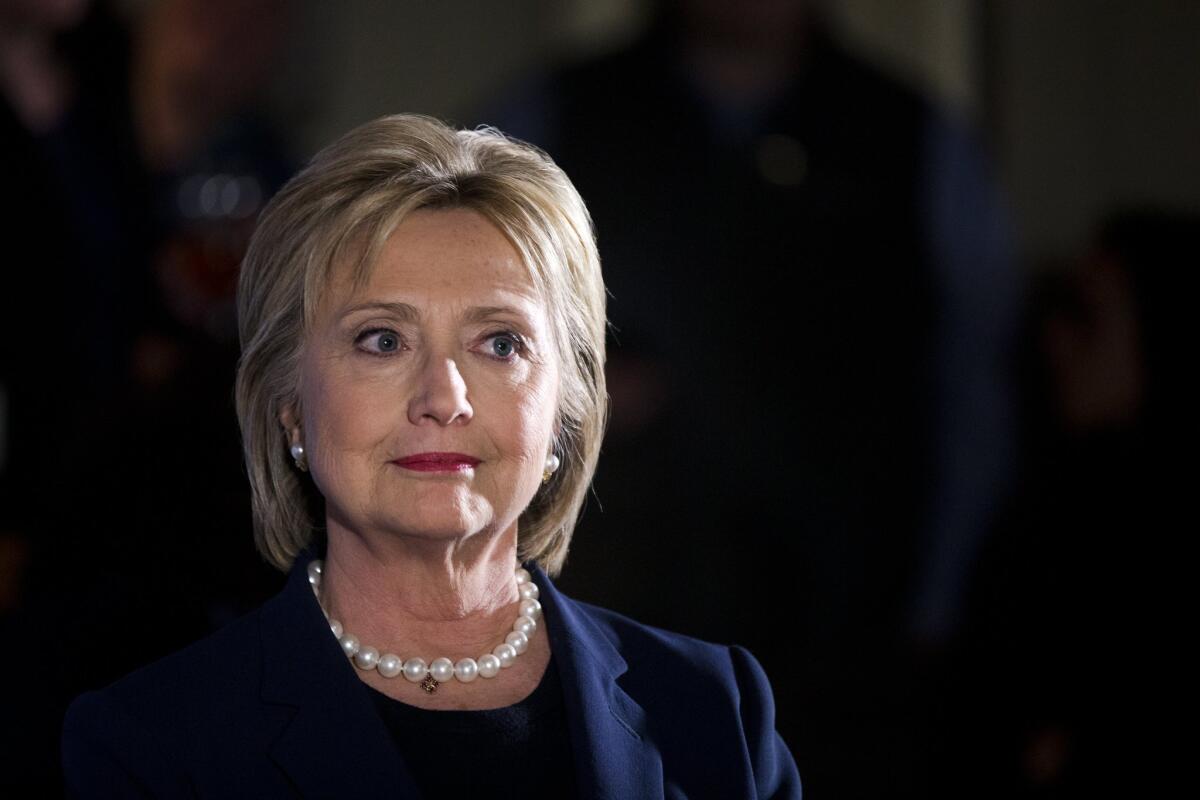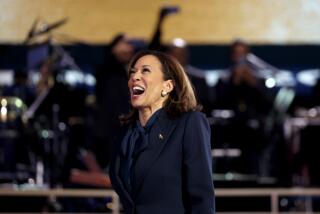Column: Hillary Clinton’s problem: Too much prose.

Hillary Clinton meets with supporters after taking part in the Democratic presidential primary debate on Thursday, Feb. 4.
- Share via
At last week’s Democratic debate in New Hampshire, Hillary Clinton repeated her central criticism of her rival, Sen. Bernie Sanders: He’s an unrealistic, ineffective utopian.
“I am not going to make promises I can’t keep,” she said, implying that Sanders had done exactly that. “I am not going to talk about big ideas like single-payer [health insurance] and then not level with people about how much it will cost.”
“You campaign in poetry,” she has often said, quoting the late New York Gov. Mario Cuomo. “You govern in prose.”
Clinton used the same line eight years ago, when she was running for the nomination against Barack Obama. It didn’t work. Will it play any better against Sanders?
Once considered the Democrats’ inevitable nominee, Clinton is facing yet another unexpectedly strong challenge from an upstart in part because she ignores the first half of Cuomo’s advice: She campaigns almost entirely in prose. Her speeches are heavy with lists of medium-sized policy initiatives, but light on soaring dreams. Asked at the debate what her top priority would be, she listed no fewer than eight items, beginning with solar panels, lower prescription drug costs and paid family leave.
Meanwhile, Sanders has been thrilling progressives with an expansive (and, yes, utopian) vision of a nonviolent “political revolution” in which millions of voters would march on Congress and compel Republicans to bow to their will, enact European-style health insurance and outlaw big campaign donations.
The contrast between prose and poetry helps explain the yawning age gap among Democratic voters in Iowa last week: Sanders won 84% of voters under 30, a number even Clinton called “amazing.” Clinton won 69% of the sadder-but-wiser voters over the age of 65.
“Progressives are looking for poetry, and Hillary could use a little more of it,” a prominent Clinton supporter complained last week. (He asked for anonymity because he wasn’t authorized to vent.) “We need those progressives in the fall; they’re the ones who show up and knock on doors.”
It’s no accident that Clinton talks mostly about practical, incremental measures for reform. That’s who she is. Her aides and allies have long described her as most passionate about the details of legislation that might actually pass Congress.
But if Clinton’s prosaic approach is a function of her character, and thus hard to change, she’s also making unforced errors.
It’s no accident that Clinton talks mostly about practical, incremental measures for reform. That’s who she is.
Her most painful moment last week came when she was asked whether it had been wise to accept $675,000 in speaking fees from the Goldman Sachs investment bank.
“That’s what they offered,” she said with a dismissive shrug. “They’re not giving me very much money now.”
What kind of politician wouldn’t have paused to consider, after all the anger about Wall Street that voters have expressed, that those speaking fees might not look good?
“I wasn’t committed to running” for president at the time, Clinton semi-explained.
She attacked Sanders for what she called “a very artful smear,” his charge that any politician who accepts millions of dollars from Wall Street interests is part of a corrupt campaign finance system. Clinton insisted that she has never changed a position because of pressure from donors. The Sanders campaign fired back with an excerpt from a 2003 book by Sen. Elizabeth Warren, who charged that Clinton changed her position on bankruptcy legislation for precisely that reason.
Clinton is stuck in the classic, awkward position of most Democratic candidates not named Sanders; she has raised millions from donors who are connected to Wall Street and other interests that most of her supporters don’t like.
She’s campaigning against the unlimited money that flows through super PACs, even though she has — as a practical, competitive matter — authorized a super PAC to raise money on her behalf.
Sanders, of course, has no such problem; he trumpets the fact that, unlike every other candidate, he doesn’t have a super PAC at all.
Clinton has enormous strengths as a candidate: intelligence, experience and more expertise in foreign policy than anyone else in the race.
She’s unlikely to win Tuesday’s New Hampshire primary, but that needn’t stop her from winning the nomination. (Second-place finishers in New Hampshire include Bill Clinton in 1992 and Barack Obama in 2008; Hillary Clinton was present both times.)
She’s still the Democrats’ national front-runner, still likely to win the nomination by grinding it out. But it won’t be as easy as it once looked; it won’t be much fun. And if she faces a deficit of enthusiasm among voters in the fall, she’ll have only herself to blame.
Twitter: @doylemcmanus
Follow the Opinion section on Twitter @latimesopinion and Facebook
More to Read
A cure for the common opinion
Get thought-provoking perspectives with our weekly newsletter.
You may occasionally receive promotional content from the Los Angeles Times.











